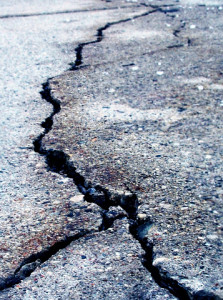One of the first lessons we learn as parents is to expect the unexpected—and try to plan accordingly. That’s why your purse doubles as a vending machine/drugstore and you have packs of wipes stashed within easy reach in every room of your house.
But here in the San Francisco Bay Area, far too many of us aren’t adequately prepared for a major event that is unquestionably coming our way (and possibly soon): the next big earthquake.
Fortunately, devising a straightforward earthquake plan for your family is not as difficult or time-consuming as you may imagine. And to help, San Francisco Moms Blog sat down with a woman who does that for a living: Katharine Turkle, a local earthquake researcher turned safety advocate and founder of Quake Plan Consulting. Here are her tips to get you started and keep you and your loved ones safe.
San Francisco Moms Blog: What are the first basic steps families should take to prepare for an earthquake?
Katharine Turkle: The first step is both free and simple: Talk to your family! Discuss the risks together and come up with an emergency plan that includes these three basic parts:
- Designate one out-of-state friend or relative to be your emergency contact hub. Program this person’s number into everyone’s phone, or, even better, memorize it. Long-distance calls via a landline or cell phone text messages will likely be the most effective ways to communicate after a major earthquake.
- Choose a meeting place. This will serve as your emergency evacuation meet-up spot if your home is unsafe or inaccessible. Select a location that is central to your daily life—ideally, someplace with minimal hazards such as overhead power lines or tall neighboring buildings.
- Learn the safest place in each room of your home. Discuss and practice with your kids how to “drop-cover-hold on” (see www.dropcoverholdon.org). Also identify potential hazards in each room such as unanchored tall furniture, loose objects on shelves and in cabinets, gas stoves, and floor-to-ceiling brick (chimneys, for example) or glass (sliding glass doors).
SFMB: What are a few items every Bay Area resident should have on hand in the event of an earthquake?
KT: Assembling an emergency kit for an entire family can be daunting, but there are a few items that are essential lifesaving tools. Please be sure to keep these emergency supplies in your home and car:
- Fire extinguishers—the more the merrier! If you have never used one, talk to your local fire department or neighborhood/community emergency response team about training.
- Water! Yes, food is important too, but dehydration is the more immediate threat.
- Medications. If anyone in your household has a condition that requires medication, keep extra supplies on hand. After an earthquake, phone communication may be limited, and emergency response teams are likely to be overwhelmed.
SFMB: What preparations are especially important for families with young children?
KT: Once you’ve formulated your Family Emergency Plan, share it with all in-home caregivers. Discuss what the caregiver is expected to do during an earthquake at home, at the park, in the car, etc. Also determine how long he/she will need to stay until you are able to take over. Remember that travel, particularly on the Peninsula, will be very difficult and slow following a major quake. If your children are in preschool or daycare, make sure to have a plan for who is picking up the child, when, and where to meet afterwards.
SFMB: How should parents talk to their young kids about earthquakes and earthquake readiness in a way that is informative but not scary?
KT: Turn safety into a game. I love to use a red light/green light-style game where you move from one part of the house to the outside in intervals: normal daily life (green light) or earthquake drill (red light). You can add challenges (aftershocks, debris piles, etc.) or even prizes. Make it fun and keep it relaxed. Another good trick is to point out your emergency meeting place to your kids each time you pass it in the car or on foot.
Involving your children in your emergency preparations will offer them a pre-designated solution to a big, scary problem, and that will help them feel more secure and calm during an earthquake even if you aren’t with them.
SFMB: What kinds of services does Quake Plan offer for families who might want some additional help making the necessary preparations?
KT: Preparing for an earthquake is something we all know we need to do, and yet most of us don’t. Why? Because we are busy—yes, that really is the main reason. Quake Plan Consulting is a local Bay Area business that works one-on-one to ensure that you are 100% prepared to deal with a major earthquake. We will build a custom emergency kit for your family as well as create a comprehensive emergency plan, including detailed hazard maps of your neighborhood. Find out more about our services at http://myquakeplan.com, or email me with questions at kat@myquakeplan.com.















